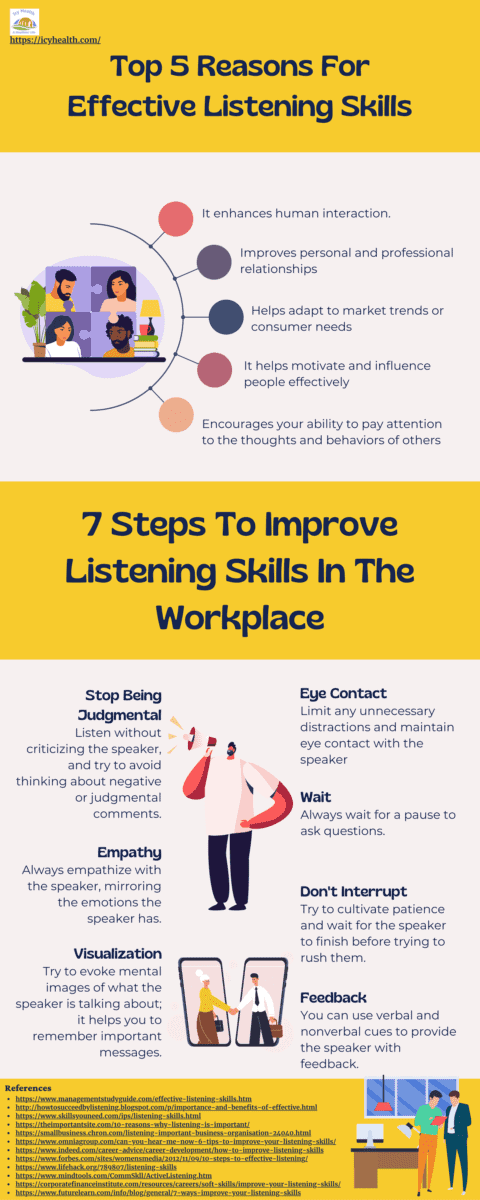Table of Contents Show
Listening is something that we do unknowingly. Merely listening to someone is not effective. Active and intentional listening is a mandatory skill that everyone needs.
For a good conversation, you have to actively listen and understand before you give a reply. Otherwise, it will always end up in miscommunication.
Not everyone is a good listener as the majority want to talk and not listen. Developing good listening skills will help you in building strong relationships.
You can improve your listening skills by being active in the conversation. You have to keep an open mind. Then you can truly understand the thoughts of the person. Judging them before hearing what they are saying is not an appreciatable activity.
Don’t interrupt people while they are speaking. Be empathetic. Then only you will know how they are feeling. Respond to them. Don’t ask questions to raise an unnecessary argument.
It is equally important that you are not imposing your solutions upon what they are saying. You can give feedback. Be relaxed. Also, notice their non-verbal cues to understand the matter wholely.
There are different types of listening. Comprehensive, deliberative, empathetic, and critical.
The basic component of communication is listening. Hearing and listening are different. You can hear everything that is around you. Passive listening is followed by the majority.
Hearing is effortless but listening requires a lot of attention and time. You need motivation and focus to intently listen. When you actively listen, you not only understand the story but the way it is told, the purpose and the message conveyed are stored in your mind.
1. Intentional Listening
Active and intentional listening happens when you highly concentrate on what the other person is saying and understand what they are saying. It is when you are sensing, responding, and evaluating what a person is saying.
Initially avoid interruptions and maintain an interest in their talking. Then start to think about what they are saying and evaluate it.
Finally, show your interest by responding to them. You can clarify if you have any doubts or queries. Do it after the person has finished talking.

When you actively listen, you will be able to repeat what the other person just said. Active and intentional listening doesn’t mean that you have to agree with the opinions of the other person. It just means understanding what they are saying.
The various degrees of active listening include repeating, paraphrasing, and reflecting. The first degree of intentional listening involves the perception of thoughts by paying attention to what they are speaking.
Remember the exact words that they said. Then think about it. With your reasoning abilities, understand their exact intention. Finally, reflect on the ideas and respond accordingly.
Intentional listening is the model of listening that you need to use. If you are not understanding what someone is saying, ask them again to explain it in a better way, using examples. Never respond without realizing the concept that they shared.
Becoming a better listener brings positive changes in your life. You will improve yourself in every aspect of life. Be it workplace or home, your listening skills will help you find solutions, avoid conflict and build better stronger relationships.
Intentional listening also requires patience. When you consciously listen to someone, exploring their thoughts and emotions needs a lot of patience and time.
2. 4 Ways of Active and Intentional Listening

2.1. Stay Focused
To be a good listener, the first thing that you have to do is to pay attention. Focus on the person who is talking to you. Identify their nonverbal interactions and notice their body language. Let them finish what they are saying.
2.2. Don’t Judge
Holding a judgment even before they complete is a bad habit. You have to be open-minded. Don’t be subjective. There are different perspectives, ideas, and possibilities.
A good listener never judges. Even if you have strong views on a subject, you should not criticize or judge them without understanding them.
2.3. Reflect
Gather the information that you are receiving and note the key points. Reflect on their feelings and thoughts.
2.4. Summarise
Confirm what you have listened to by repeating it. In this way, you know the other person’s thoughts. Summarise the thoughts. You will be clear with the conversation.
2.5. Share and Clarify
Once the other person completes their talking, clarify your doubts. If something is unclear, ask them and make it clear.
When you are clear about their idea, you can share your views positively. Share your experiences regarding the subject.
3. Benefits of Intentional Listening
There are multiple benefits that you can gain by becoming an active listener. Develop good listening skills and achieve them.

- You can find and solve problems easily with intentional listening. Understanding someone else’s perspective helps you to analyze an issue efficiently. It will help you to give better solutions by addressing the root cause.
- The level of your patience increases when you become a good listener. Once you start practising intentional listening, patience will automatically get into you.
- The foundation of every relationship is trust. You can build deep trust by investing your time in people by actively listening to them. It will help you gain good friends and sustain your relationship.
- There is less chance of committing mistakes if you are an active listener. When you listen and understand, there is no room for miscommunication. It will help you to save a lot of time and money. You will not fall into traps as you are intently listening and understanding their motives.
- A good listener is open-minded. This helps to broaden your perspectives and enriches your worldview. You will look at things differently as you know the various possibilities.
- No one loves talking to an impatient and judgemental listener. By being a good listener, you will attract people. They will feel comfortable and will approach you at ease. This makes your relationships stronger as they will always come to you.
4. Signs Of Intentional Listening
You will get annoyed when you notice someone not listening while you speak. Also, it is crucial to know whether they are aware of your understanding.
Therefore, you need to indicate your awareness. This can be done in a few simple ways. You can check whether they are truly listening by observing the signs of intentional listening:
- If the person is actively listening, they are likely to maintain eye contact. Too much eye contact is intimidating. A balanced level of eye contact suggests that they are engaged in listening to you.
- Another thing that indicates active listening is a smile. A smile is simple. When a listener smiles at you, it is a way of agreeing. They might also nod their head. This affirmation shows that they are happy and the message is fully received.
- A true listener will not even notice slight distractions. They will not look at a clock or a watch or any other distractions. They won’t be playing with their fingers or hair. They will be involved in your talk.
- Posture is an important factor that helps to analyze a good listener. An intentional listener may lean towards you while listening to show interest.
- If your listener is encouraging you while you talk by giving positive affirmations like ‘yes’ or ‘good’, they are actively listening.
- Asking relevant questions is a sign of being a good listener. This shows their interest and understanding.
- If they are clarifying points, it indicates intentional listening. Such a discussion will not put forth an argument as they are trying to understand rather than criticize.
5. Hurdles to Active Listening
There are always distractions while listening. Some of them cannot be controlled even by a good listener. For a better listening experience, you need to choose a distraction-free environment.

The most common hurdle that you might come across is noise. It interrupts your listening and often makes you uncomfortable. You will possibly lose focus if there is too much noise.
The human brain can focus on one thing for a particular period. This differs in each individual. Once you listen for a long time, you may not be able to focus even if you are interested.
Sometimes, a listener cannot surmount their inner thoughts regarding the subject. This eventually leads to a fixed mind. It lowers the level of understanding.
In a state of fear, you may not be able to understand the message or correctly interpret it. If the subject is believed to be too complex for the listener, they will lose interest.
6. Conclusion
You can practice intentional listening to improve your life. Various exercises can boost your listening skills. Do virtual reality exercises to understand your level of eye contact and memory power.
Practice summarising. Know the key points and write a summary. This develops your awareness and helps you to be more focused.
Listening is a voluntary activity that can be improved by constant training. Be a good listener and reap the benefits.
Discover more about healthcare.
7. Frequently Asked Questions
Q1. What Is Intentional Listening?
Intentional listening skills involve suspending all judgment, quieting your mind, and focusing on the other person. It involves giving your undivided attention to really understand what they are saying. Truly great listeners don’t just listen to spoken words.
Q2. Why Is It Called Active Listening?
Active listening is exactly what the name suggests. It is about fully focusing on what is being said, rather than passively “listening” to the speaker’s message. Active listening involves listening with all your senses.
Last Updated on by Arnab






